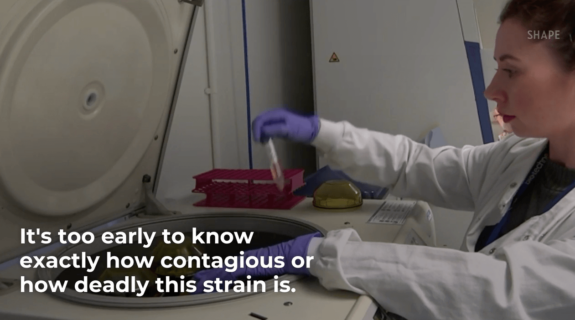Wait, so what’s the difference between the coronavirus and the flu or the common cold?
It’s true that coronavirus symptoms more or less resemble those associated with a common cold or the flu, says Dr. Nilsen. And, much like the cold or flu, coronavirus can be diagnosed via lab tests ordered by your doctor, according to the CDC. However, the important difference between coronavirus and the flu or common cold is that people infected with this coronavirus strain appear to be more likely to suffer significant, potentially deadly respiratory distress (read: pneumonia), compared to people infected with other coronavirus strains, other common cold viruses, or even the flu, he explains. (Refresher: Here’s the difference between cold and flu.)
Also concerning: Research suggests this coronavirus may be genetically close to SARS, says Eyal Leshem, M.D., director of the Center for Travel Medicine and Tropical Diseases at Sheba Medical Center in Israel. “Because SARS infections have a 10 percent mortality risk, this genetic resemblance is alarming,” he notes.
For context, despite the especially-severe flu seasons seen in recent years, the mortality rate for the flu is still around 0.1 percent, based on last year’s CDC flu data. The Spanish Flu of 1918—the most severe pandemic in recent history that killed roughly 500 million people around the world—had a 2.5 percent mortality rate. As for this new coronavirus strain, some estimates are claiming the mortality risk could be as high as 3 percent for those who become infected. Don’t panic, though: This could be an overestimate given there’s probably a large number of infected people who don’t have severe enough symptoms to warrant a hospital visit (meaning their data isn’t being taken into account when calculating the mortality risk), reports The Guardian. And yes, this could mean some people are walking around with the infection and unknowingly spreading the virus. Regardless, though, it’s still too soon to estimate an accurate mortality risk for this coronavirus strain—not to mention that, again, it’s still unclear whether people who don’t show symptoms of this coronavirus are still contagious.
Also, once a person becomes infected, recovery basically depends on the strength of the person’s immune system. That means extremely young and elderly people, along with people with weakened immune systems, are most at risk for severe complications from this coronavirus.
